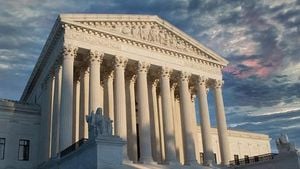After nearly a decade of relentless campaigning and political wrangling, the long-awaited Hillsborough Law—formally known as the Public Office (Accountability) Bill—has finally been introduced to the UK Parliament, marking what many hope will be a turning point in the nation’s approach to official accountability. The bill, which seeks to impose criminal sanctions on authorities that attempt to cover up the facts behind public disasters, has been hailed as a landmark by bereaved families and justice campaigners who have spent years fighting for transparency and truth.
On September 16, 2025, campaigners gathered at Downing Street to meet Prime Minister Sir Keir Starmer, reflecting on a journey that began in the aftermath of the 1989 Hillsborough disaster. That tragedy, which claimed the lives of 97 Liverpool football fans during an FA Cup semi-final against Nottingham Forest at Sheffield, became infamous not only for the scale of loss but for the decades-long battle waged by families to overturn false narratives and institutional failures. In the days following the disaster, police fed the press misleading stories blaming the supporters, leading to a 27-year campaign before an inquest finally ruled the fans were unlawfully killed and not to blame.
The new bill, as outlined by the government, introduces several "seismic" changes. Chief among them is a professional and legal duty of candour, which requires public officials to act with honesty and integrity at all times or face criminal sanctions. According to the government, this provision aims to end the culture of cover-ups that has plagued responses to disasters like Hillsborough, the Grenfell Tower fire, the infected blood scandal, and the Post Office Horizon scandal. The bill also brings the largest expansion of legal aid in a decade for bereaved families, offering non-means-tested support for inquests, and creates a new offence for misleading the public, with criminal penalties for the most serious breaches.
Margaret Aspinall, who lost her 18-year-old son James at Hillsborough, spoke alongside Sir Keir Starmer at Number 10, expressing both relief and hope. "I thought this is a day that was not going to happen," she said, according to the Press Association. "This is not just about a legacy for the 97. This is a legacy for the people of this country and I think that is the most important thing." Her words echoed the sentiments of many families who have advocated for years to ensure that future generations are spared the suffering and injustice they endured.
Prime Minister Starmer, for his part, acknowledged the courage and persistence of the campaigners. He told them, "You have changed the lives not just of the families involved in all of those scandals and injustices, you are also going to change the lives of thousands of people you will never meet, who for years and years and decades and generations to come will now be able to point to what you have done and say ‘we don’t have to go through that’." Starmer had previously promised that the law would be enacted by the 36th anniversary of the Hillsborough disaster on April 15, 2025, but delays in drafting the legislation meant the deadline passed. Downing Street explained that additional time was needed to ensure the bill was robust and would not be undermined by loopholes.
The Hillsborough Law’s journey through Parliament has been anything but straightforward. The first legislative attempt came in 2017, when Andy Burnham, then mayor of Greater Manchester, put forward a private members’ bill. That effort fell when Parliament was dissolved for the general election. A subsequent attempt—Labour MP Maria Eagle’s Public Advocate (No. 2) Bill in 2022—also failed to pass before the end of the parliamentary session. Even as recently as July 2025, Liverpool MP Ian Byrne’s bid to reintroduce the original bill was voted down, with the government opting to draft its own version instead.
Now that the Public Office (Accountability) Bill has been introduced, it faces the usual legislative hurdles: debate and voting in both the House of Commons and the House of Lords. The second reading is scheduled for October 13, 2025. Campaigners and advocacy groups are watching closely, wary of attempts to water down key provisions. The Hillsborough Law Now campaign group has urged the government to "be brave and ignore the vested interests" of those who might seek to dilute the bill. As a spokesperson told Sky News, "It will only achieve its aims if it is passed in full."
Concerns about potential dilution are not unfounded. Some campaigners have expressed fears that the duty of candour could be weakened by loopholes, rendering it "useless and ineffective." Elkan Abrahamson, one of the architects of the original bill, has pledged to scrutinize the legislation as it moves through Parliament, stating, "so we’re not quite there yet." Sue Roberts, whose brother Graham was unlawfully killed at Hillsborough, described the bill’s introduction as "a huge step in the right direction" but emphasized that families will be "watching closely to ensure this Bill is passed in its entirety and enacted in full."
The bill’s impact extends far beyond the Hillsborough disaster. It has garnered support from victims and families affected by the Grenfell Tower fire, the infected blood scandal, and the COVID-19 pandemic. Natasha Elcock, from Grenfell United, told the Press Association, "It has been so easy for public and private agencies to escape accountability and scrutiny. By establishing a duty of candour, Hillsborough Law will prevent this, help us learn from failures and ensure bereaved and survivors are properly supported." Lobby Akinnola, who lost his father during the early days of the COVID-19 pandemic, added, "This new Bill is a huge step towards justice."
The expansion of legal aid has also been widely welcomed. Julia Waters, whose sister Ruth Perry took her own life after an Ofsted report downgraded her school, described the current system as "profoundly unjust" after her family was forced to crowdfund legal costs for an inquest while public bodies had their expenses covered. The new provisions, she said, will help level the playing field for bereaved families seeking the truth.
For many, the introduction of the Hillsborough Law represents not just the culmination of a long struggle but the beginning of a new era of accountability. As Prime Minister Starmer declared, "This is change only this Government can deliver." Yet, as the bill winds its way through Parliament, campaigners remain vigilant, determined that the law will not only honor the memory of the 97 but also serve as a lasting safeguard for all citizens against institutional injustice.
The coming weeks will reveal whether the government can deliver on its promise to enshrine these protections into law, offering a legacy of truth and justice for generations to come.





